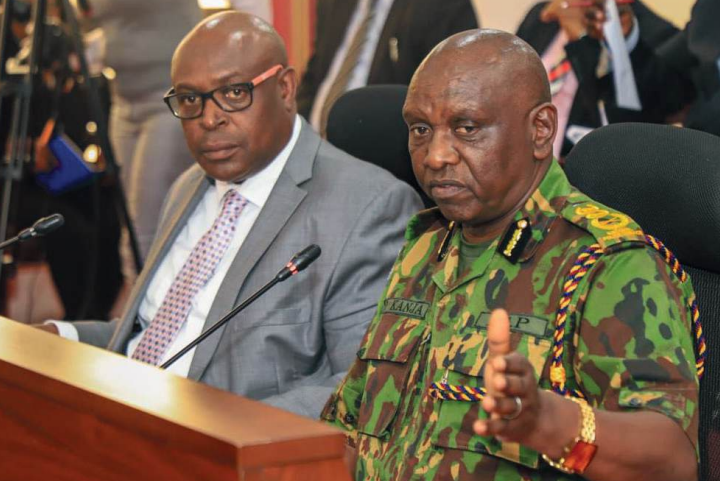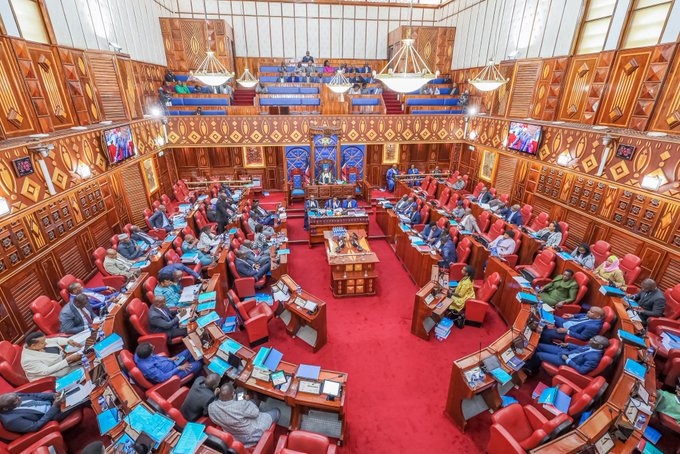
The government is considering reversing its policy of housing police outside duty stations and instead housing all officers in their station compounds.
Inspector General of Police Douglas Kanja made the suggestion on Thursday while meeting the National Assembly’s Committee on Administration and National Security chaired by Narok West MP Gabriel Tongoyo.
Kanja called for more institutional housing units, compared to the current set up in which officers live away from their stations and only a few of them live in older inadequate and deteriorating police housing.
The police boss urged prioritising construction of officers’ houses within station grounds, citing inadequate and distant police housing as a major setback to ensuring the best law enforcement services.
IG Kanja said the National Police Service has about 20,000 housing units but the workforce is about 100,000 officers.
“Even with shared occupancy arrangements, only a small proportion of officers get accommodated in these units, forcing the majority to seek alternative housing, often located several kilometres away from their duty stations,” he said.
The existing houses, he added, are not in good shape.
“Regrettably,
most of these houses have deteriorated due to inadequate maintenance and
delayed renovations, adversely affecting the welfare and living standards of
officers who occupy them,” he told MPs.
“The housing has certainly been a problem and because of the uniqueness of our services, we find that most of the time, it has been in our camps or stations but again, there are also other policies.
“So, our proposal is that as we continue to address the issues of housing, let us ensure priorities that they are within our institutions, that we have houses where the officers can be accommodated.”
The police boss said the initiative will ensure officers live closer to their workplaces, enhance discipline and cut costs.
Despite the policy shift that led to the transfer of housing management responsibilities, Kanja said his office has been receiving numerous complaints and requests from affected officers, most of whom travel long distances to work stations.
“The welfare of officers is central to morale, productivity and integrity within the NPS,” the IG added. “Well-supported officers are better positioned to serve the public professionally.”
On the housing allowance, Kanja told the National Security committee that the service is guided by the recommendations of the recent former Chief Justice David Maraga-led task force report and the Salaries and Remuneration Commission revised formula on the payment for police officers.
Under the existing framework, officers are entitled to housing allowances structured according to their job groups and deployment locations, which have varying costs of living across different clusters.
In the
arrangement, Cluster A covers Nairobi, Cluster B Mombasa, Kisumu, Nakuru, Meru
and Uasin Gichu, while cluster C covers all other counties.
The highest amount paid for clusters A, B and C for Job Group T is Sh80,000, then Sh70,0000 and Sh52,000, respectively. In the lowest job group F, officers are paid an allowance of Sh9,500, Sh7,000 and Sh5,500 for their clusters.
IG Kanja welcomed President William Ruto’s directive that 20 per cent of the affordable housing units be reserved for police officer. He said it would enable access to decent and affordable home ownership.
Following the transfer of management of police housing to Housing department, the police boss said the move was intended to enable NPS to focus more effectively on its core mandate of national security. Therefore, he said, NPS no longer gets budgetary allocations for maintenance or refurbishment of housing units.
For the financial year 2025-26, NPS has an allocation of Sh15 billion for housing allowances to officers. A further Sh20.8 million has been approved for capital projects related to police housing.
Acting Secretary for Housing Cassius Kusienya, who also attended the committee session, informed MPs that 33,517 housing units had been transferred to security agencies.
Kusienya said 16,551 units were given to the Kenya Police Service, 7,631 units to the Administration Police Service and 9,335 units to the Kenya Prisons Service.
He also said that in December 2018, free housing for officers living in police lines was discontinued and replaced with a market-based housing allowance for officers below the rank of Inspector.
This shift
has led to challenges, he said, as some officers still experience improper
payroll deductions for units they no longer occupy, creating financial strain
and lowering morale.
Due to budget constraints, Kusienya said, only minor repairs in 525 units have been completed.
Under the affordable housing programme, 962 units for police are completed or ongoing; 4,681 units are part of newly awarded projects; 400 projects have been awarded but are yet to commence; while 3,099 units are in the procurement stage.
MPs led by committee chairman Tongoyo questioned documentary evidence on the complete projects.
“You needed to have presented certificates of completion to the committee. The documents should be supplied to Parliament by Tuesday next week,” he said.













